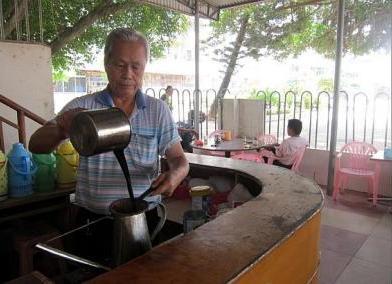Men in short-sleeved shirts and rolled-up trousers sit around square tables, catching up over cups of a thick black brew. In one corner, a man and a woman are also having a cuppa.
In Xinglong, a town of 25,000 people in the southeastern island province of Hainan, the beverage of choice is coffee, unlike in other parts of China where tea rules.
It has been this way since the 1950s, when waves of ethnic Chinese were expelled from Malaya and later Indonesia for being communist supporters and resettled in Hainan. They brought back with them robusta coffee beans and started sowing the seeds of Xinglong’s unique coffee culture.
In Xinglong, a town of 25,000 people in the southeastern island province of Hainan, the beverage of choice is coffee, unlike in other parts of China where tea rules.
It has been this way since the 1950s, when waves of ethnic Chinese were expelled from Malaya and later Indonesia for being communist supporters and resettled in Hainan. They brought back with them robusta coffee beans and started sowing the seeds of Xinglong’s unique coffee culture.

There are about 100 cafes and coffee shops here, unusual in a country where coffee is still rare in small towns and cities.
“In Xinglong, when people sit down, they will drink coffee and not tea,” said retired school principal Du Tianjiang, 74.
Pepper and rubber were grown, too, in the Xinglong Overseas Chinese Farm, one of 84 farms set up in China for returnees. But it was coffee that helped Xinglong ― meaning prosperous in Chinese ― make its name.
The local brew became famous in China after then-Premier Zhou Enlai sang its praises on a visit in 1960. “He said it was world-class,” recalled Du. “He said, ‘I have drunk coffee from many other countries, but our homegrown coffee is better.’”
Like Xinglong’s coffee beans, Du was also not originally from the Hainan town about two hours’ drive from capital Haikou. Instead, he was born in Java, Indonesia, to immigrant parents from southern Guangdong province. The Chinese-educated young man decided to move here after the People’s Republic of China was set up in 1949.
“I wanted to take part in the construction of China. At that time, Indonesia was embarking on the persecution of Chinese, so we came back,” he said.
Former chef Huang Guanxin, 64, was also born elsewhere ― in his case, Perak ― but was brought to Hainan in 1952 as a toddler after his father got into trouble for sheltering Malayan Communist Party members.
The newcomers had the habit of drinking coffee back in Southeast Asia and continued to do so in Hainan.
“We have been drinking coffee from (when we were) young and have a lot of feelings for it. We’d feel strange if we don’t have two cups a day,” said Huang, who helps out at his son’s coffee shop.
In Xinglong, the robusta coffee beans were processed using traditional methods from Southeast Asia, said Fu Changming, head of the Hainan Coffee Association. The beans are roasted with margarine, sugar and salt and then filtered to prepare black coffee or kopi o, as it is known in Singapore.
Xinglong coffee was so fragrant it could be smelled for miles, said Huang. “You can’t steal any coffee powder. No matter where you go, people can sniff it out,” he joked.
In the 1960s, coffee plantations were everywhere in Xinglong. But during the Cultural Revolution, a topsy-turvy period from 1966 to 1976 when the leftists grabbed power and lashed out against all things foreign or bourgeois, coffee was seen as the devil’s drink.
“When Jiang Qing visited, she said coffee will make people’s hearts black,” recalled Du, referring to the wife of Chinese leader Mao Zedong. Swathes of coffee trees were chopped down.
These days, a cup of sweetened and thick coffee is readily found in coffee shops with names like Nongqing (“Thick Feelings”) or Vasily, after a character in Soviet film “Lenin” in 1918. A cuppa costs 2 yuan (32 cents) in roadside shops and up to 80 yuan in upmarket hotels, said Du.
But the town has not cashed in on its coffee fame. Rather, many of its coffee plantations have given way to more lucrative cash crops like rubber or banana.
A first-time visitor here is more likely to notice its hot spring hotels and resorts, or banners promoting it as a town for betel nuts or transvestite shows.
Coffee factories elsewhere are passing off their products as those from Xinglong and there is little the town can do because it did not register Xinglong Coffee as a trademark.
If this is not bad enough, its status as Hainan’s most famous coffee town is threatened by Fushan in the north, which has promoted itself aggressively by setting up a coffee culture museum and holding coffee festivals.
There’s talk of revitalizing Xinglong’s coffee business, but this remains a faraway dream.
As Huang lamented: “If only we had put emphasis on this in the 1980s. But we didn’t care.”
By Ho Ai Li
(The Straits Times)
-
Articles by Korea Herald








![[Graphic News] More Koreans say they plan long-distance trips this year](http://res.heraldm.com/phpwas/restmb_idxmake.php?idx=644&simg=/content/image/2024/04/17/20240417050828_0.gif&u=)
![[KH Explains] Hyundai's full hybrid edge to pay off amid slow transition to pure EVs](http://res.heraldm.com/phpwas/restmb_idxmake.php?idx=644&simg=/content/image/2024/04/18/20240418050645_0.jpg&u=20240419100350)






![[From the Scene] Monks, Buddhists hail return of remains of Buddhas](http://res.heraldm.com/phpwas/restmb_idxmake.php?idx=652&simg=/content/image/2024/04/19/20240419050617_0.jpg&u=20240419175937)

![[KH Explains] Hyundai's full hybrid edge to pay off amid slow transition to pure EVs](http://res.heraldm.com/phpwas/restmb_idxmake.php?idx=652&simg=/content/image/2024/04/18/20240418050645_0.jpg&u=20240419100350)

![[Today’s K-pop] Illit drops debut single remix](http://res.heraldm.com/phpwas/restmb_idxmake.php?idx=642&simg=/content/image/2024/04/19/20240419050612_0.jpg&u=)